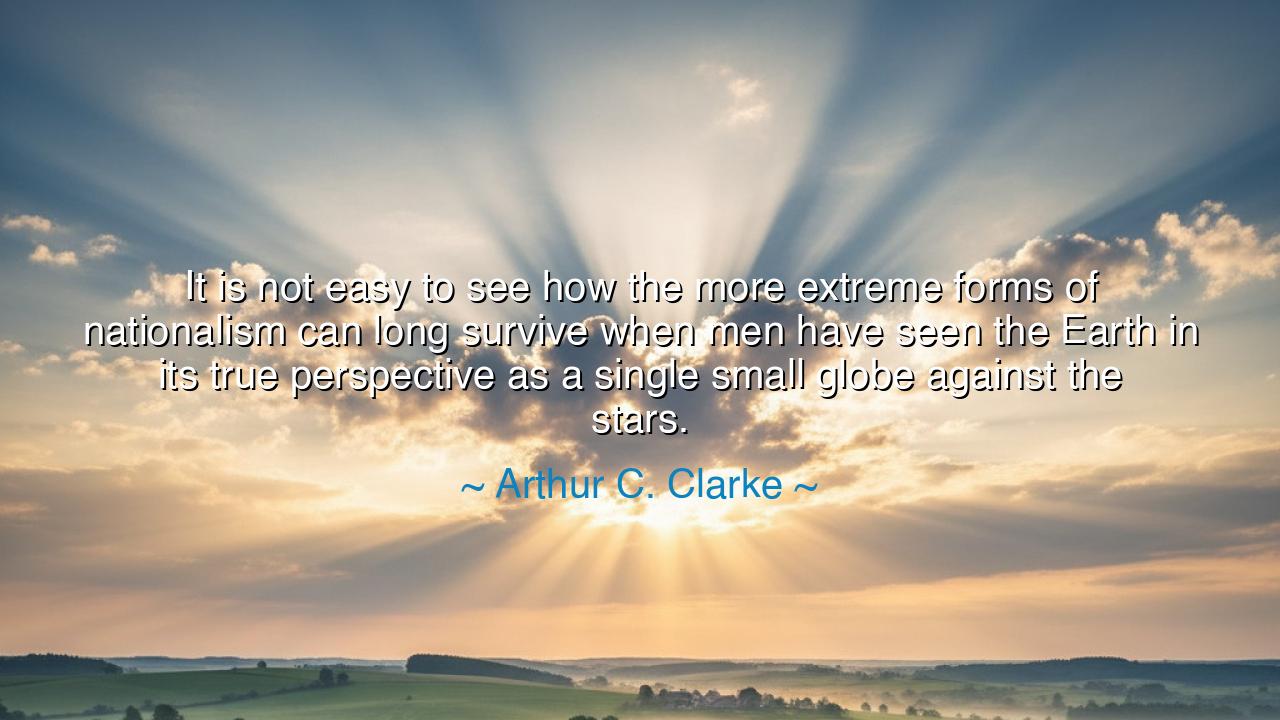
It is not easy to see how the more extreme forms of nationalism
It is not easy to see how the more extreme forms of nationalism can long survive when men have seen the Earth in its true perspective as a single small globe against the stars.






Arthur C. Clarke, the seer of the stars, once declared: “It is not easy to see how the more extreme forms of nationalism can long survive when men have seen the Earth in its true perspective as a single small globe against the stars.” In these words lies both awe and admonition. He speaks as one who gazes not at the quarrels of men, but at the infinite heavens. He reminds us that the banners we raise, the borders we defend, the divisions we cherish, all shrink to nothing when set against the vastness of the cosmos. In the face of eternity, our wars seem petty, and our pride, foolish.
The origin of this wisdom rests in the dawning age of space exploration. Clarke, who foresaw satellites before they circled the Earth, lived in an age when humanity first looked back upon itself from the heavens. When astronauts sent home images of the Earth, a fragile blue marble suspended in darkness, the illusions of separateness were shaken. From that vantage, there were no nations, no borders, no flags—only one planet, one people, one home. Clarke believed that once men truly grasped this perspective, the fever of extreme nationalism would lose its hold.
History gives us a powerful example. In 1968, the crew of Apollo 8 circled the Moon and captured the image now known as “Earthrise.” The photograph showed our planet rising above the barren lunar horizon, a tender orb of blue and white in the void. Many who saw it felt their hearts pierced with humility and wonder. Wars still raged on Earth, but for a moment, men realized the folly of their divisions. That picture did more for the cause of peace than a thousand speeches, for it revealed, with silent majesty, the unity of humankind. Here was Clarke’s vision made flesh: the Earth in its true perspective.
And yet, how stubborn is the heart of man! Even after the stars revealed our smallness, many clung to their old divisions. Still nations warred, still peoples despised one another, still leaders cloaked greed with the word patriotism. Clarke’s words remain both a hope and a rebuke: a hope that one day our vision will rise above the soil, and a rebuke that even when shown the truth, we choose blindness. For the danger of extreme nationalism is not only violence, but the refusal to see beyond oneself, the denial of the greater whole.
But Clarke does not counsel despair. He points to the stars as a teacher. He calls us to look upward and outward, to let the infinite school us in humility. For when we behold Earth against the stars, our quarrels seem like the squabbles of children, our divisions like lines drawn in sand before the tide. What endures is not the supremacy of one nation over another, but the unity of mankind upon its small and fragile globe. Thus, Clarke’s teaching is not only about science—it is about the soul.
The lesson is this: let your patriotism be gentle, humble, and wise. Love your country, yes, but not in hatred of others. Defend your land, yes, but not in blindness to the greater family of man. Remember always that your nation is but one branch of the great tree, and that to cut at other branches is to harm the whole. Let your love of homeland lead you not into arrogance, but into stewardship of the Earth, for it is the only home we share.
Therefore, when you look upon the stars, remember Clarke’s words. Teach your children not only of their nation’s history, but of the Earth’s unity. When pride tempts you to despise another people, recall that from the heavens, no borders are visible. And when voices stir hatred in the name of nationalism, let your heart whisper instead of the fragile globe suspended in darkness. For one day, perhaps, we may learn to live not as tribes forever at war, but as citizens of the Earth itself.
So let us carry Clarke’s vision like a torch into the future. Extreme nationalism may perish, but love of humankind can endure. The Earth is one, the stars are many, and we—small yet capable of greatness—must learn to cherish one another, lest our divisions destroy the only home we have beneath the endless sky.






AAdministratorAdministrator
Welcome, honored guests. Please leave a comment, we will respond soon